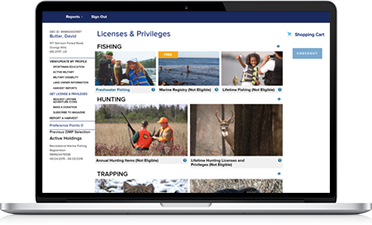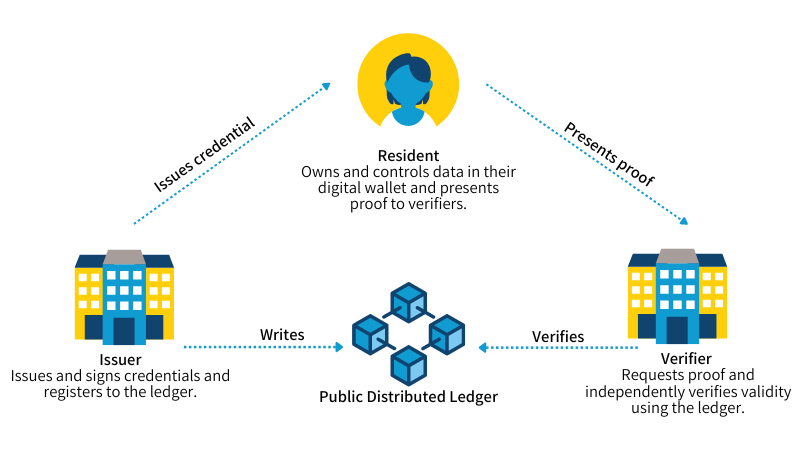How Self-Sovereign Identity Can Reduce the Time, Cost, and Burden of Licenses and Permits
How Self-Sovereign Identity Can Reduce the Time, Cost, and Burden of Licenses and Permits
State-issued permits and licenses are typically required for driving, hunting, fishing, and a wide range of occupations: doctor, lawyer, teacher, physician, nurse, therapist, cosmetologist, building contractor, and more.
Local governments also issue an abundance of permits and licenses. Permits are often required, for example, to build, alter, move, or demolish a structure, or to install electrical service, plumbing, heating, and air-conditioning.
Revenue generated by licensing and permitting is an important part of state and local government’s fiscal health. But for state and local agencies, the cycle of receiving, processing, accepting, or denying license and permit applications never seems to end. For residents, it can feel the same way.
Fortunately, self-sovereign identity (SSI) can make licensing and permitting faster, easier, and more secure for both agencies and the residents they serve. The innovative approach is achievable today, and it can vastly improve government operations and resident experiences.

Voyatek partnered with The Department of Environmental Conservation (NYSDEC) to deliver an Amazon-like shopping experience for NYS Sportsmen and Sportswomen, which reduced transaction by 75%. NYSDEC received accolades from the New York State Town Clerks Association on the new user interface, both for the greatly improved ease of use and significant performance improvement.
The Dilemma of Resident Data
Most residents view licensing and permitting as a burden. One reason is that every application requires them to validate who they are and then submit and verify relevant data.
That data typically includes personal identifiable information (PII) such as name, address, phone number, and date of birth. It might also include Social Security number or financial data. For occupational permits and licenses, applications might involve information submitted by occupational boards or educational institutions.
The applicant must gather the data from multiple sources and manually enter it in an application form. Your agency needs to verify the applicant’s identity and every piece of data provided. The process is prone to error and can take weeks or months for your staff to complete.
Just as significant, the agency needs to store and manage the data. Multiple agencies across multiple levels of government end up with a hodgepodge of resident PII. Some is inaccurate, incomplete, or inconsistent.
The more PII an agency maintains, the more likely it is to suffer a data leak. As one example, in mid-2022 the California Department of Justice revealed that a data breach of its Firearms Dashboard Portal exposed the PII of every concealed-carry permit holder in the state.
In February of 2022, the Washington State Department of Licensing (DOL) announced that 650,000 residents were impacted by a data breach in its professional licensing system.
SSI to the Rescue
SSI does away with these headaches because it’s a decentralized identity solution. With decentralized identity, PII is never stored by the agency. Instead, verification takes place through a blockchain distributed ledger.
Here’s how it works. When a government agency issues a resident a valid credential, it’s stored securely in the resident’s digital wallet. If they need to use that information to transact with another agency, it’s verified via the public ledger or blockchain. In other words, the agency can see that the information is authentic without manually verifying or storing it.
When a resident needs to verify personal information, like income, they can submit it for verification with a single agency, after which it’s trusted and usable everywhere—but only stored in their digital wallet.
 For these reasons, SSI is a game changer. In fact, “self-sovereign identities represent the next major paradigm shift in identity and access management (IAM) [and] are set to permanently change the IAM landscape, because they are privacy-conscious, end-user-centric, and extend well beyond just registration and authentication use cases to credentials, authorizations, and proofs,” according to Forrester.
For these reasons, SSI is a game changer. In fact, “self-sovereign identities represent the next major paradigm shift in identity and access management (IAM) [and] are set to permanently change the IAM landscape, because they are privacy-conscious, end-user-centric, and extend well beyond just registration and authentication use cases to credentials, authorizations, and proofs,” according to Forrester.
License and Permit Use Cases
The list of use cases for SSI is as long as the menu of licenses and permits. Here’s one example
Maria is a resident of Maryland. She wants to purchase a fishing license. Using a traditional approach, she might create a profile on the Maryland Department of Natural Resources (DNR) website, log in with a username and password, and upload an image of her driver’s license. The DNR would then store her PII.
But with SSI, she’d simply use her digital-vault app to allow the DNR to securely validate the only data actually required: her date of birth and home address. The DNR could instantly validate Maria’s PII, without needing an employee to manually check its authenticity and without having to store, manage, and protect it.
Permitting and licensing is just one area where SSI will deliver tangible benefits to agencies and their constituents. Residents can gain control over their own data and validate PII in minutes. Agencies can be confident they’re engaging with the right person and the data is valid. The result? Reduced time, cost, hassle, and cybersecurity concerns, and improved agency services and government trust.

